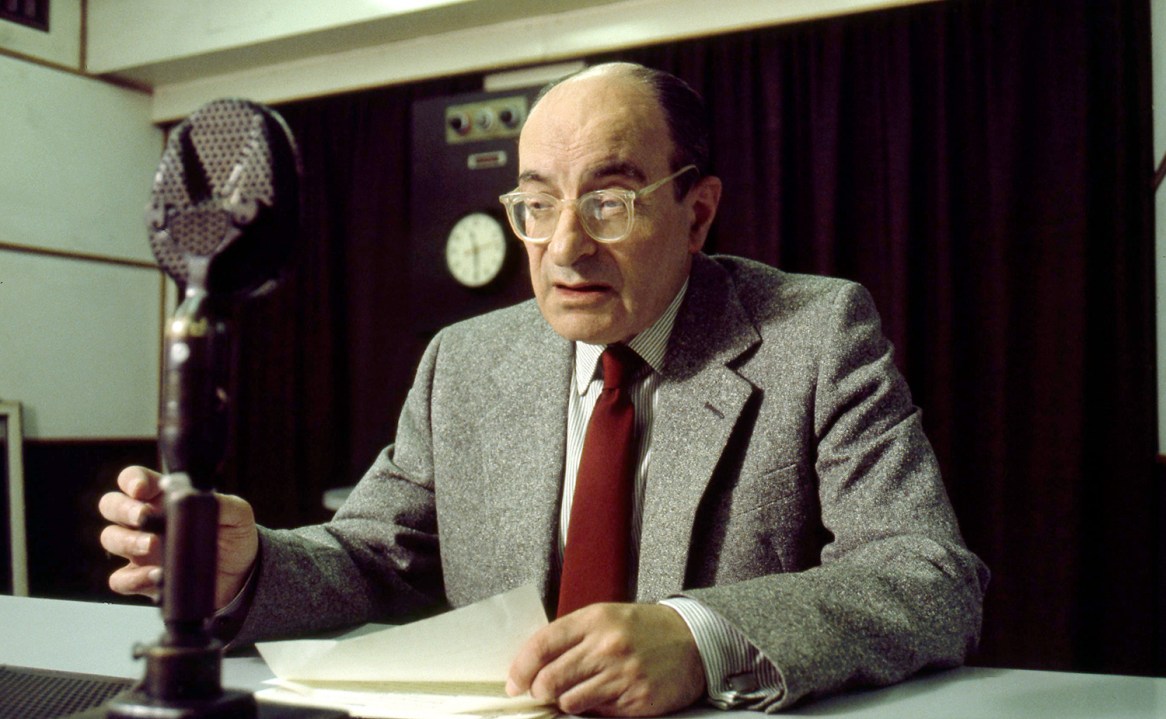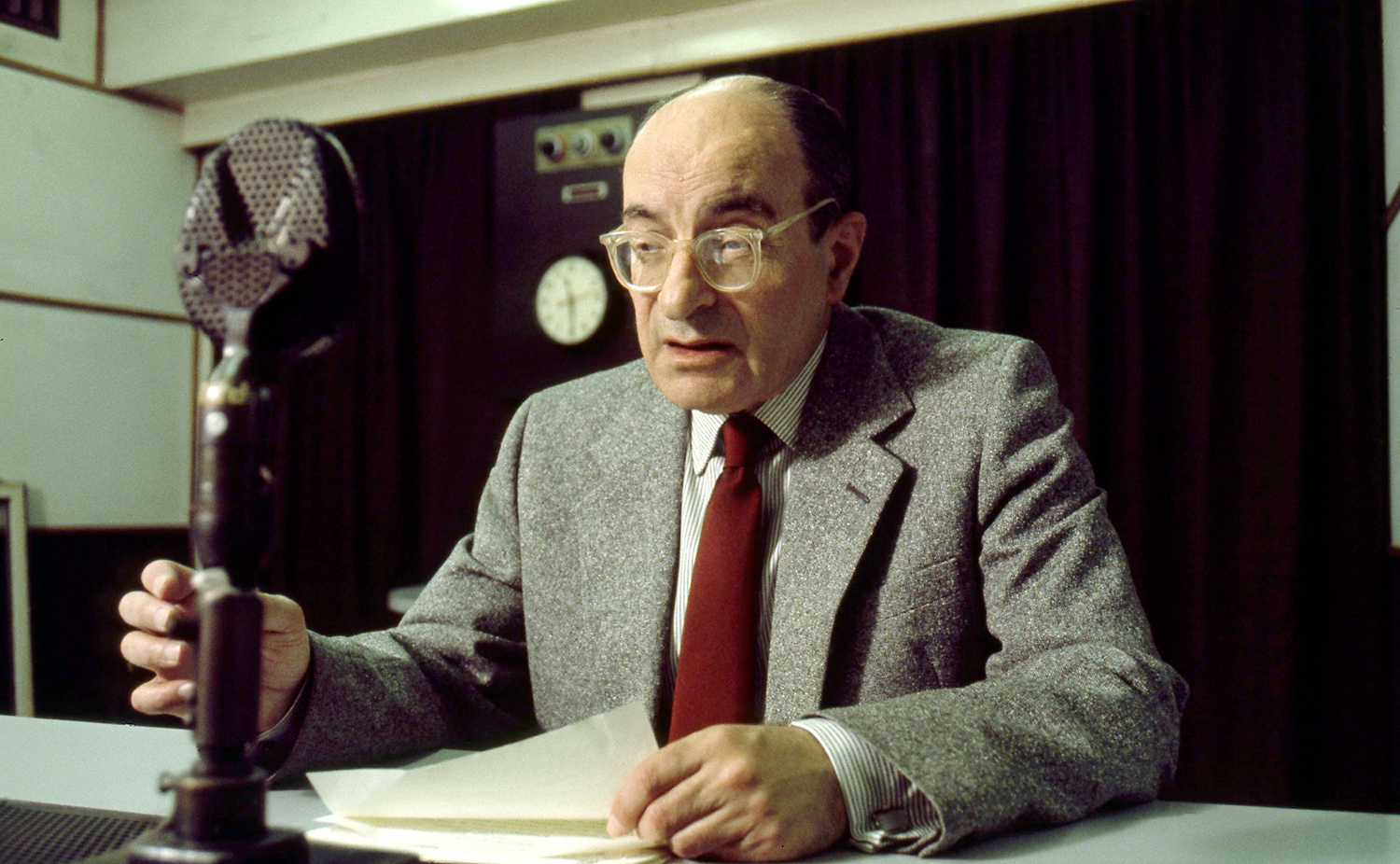In 1957 the BBC removed the head of the Russian Service. Anatol Goldberg was by all accounts a remarkable broadcaster, tasked with coordinating, producing and narrating the BBC’s radio output to the USSR at one of the most volatile periods of the Cold War. Internal reports praised his navigation of the ‘complications’ of Russian programming. So why was he demoted? The answer lies in the long history of British government interference in the World Service.
Today harmony reigns between state and Service: the government announced a one-off £20 million payment to the World Service in last week’s updated Integrated Review. Yet last year foreign-language broadcasting was facing a £28 million cut after the licence-fee freeze. The message is confusing: is the World Service superfluous, or a vital adjunct of British diplomacy? Goldberg’s story makes an intriguing case for its indispensability.
Leafing through his transcripts from the 1950s, it is easy to see the revolutionary potential of radio broadcasting. In his Notes by Our Observer series, Goldberg took up the call to tackle the proliferation of misinformation by Russian state media. He spoke of the virtues of the democratic system, and Britain’s position as its originator, a nation with sovereign institutions run by the people, for the people. This would be routinely contrasted with the Soviet election, branded a ‘check-up from below’ by one high-up Soviet functionary: ‘We know that as regards to political parties, there is no choice. There exists only one political party, which means that at a Soviet election the party element is not taken into account and a check-up from below is impossible.’
The cost of probing and penny-pinching is the loss of indispensable diplomats like Anatol Goldberg
Born in St Petersburg in 1910, Goldberg left the country shortly after the October revolution and moved to London in 1936, where he began working for the BBC Monitoring Service and then on to the Russian Service at the end of the war. He was an outsider who employed his dual nationality as a Russian and naturalised Brit to present an authentic account of a refugee’s journey towards capitalist enlightenment and invited the listener on a similar journey. Central to this was giving the impression that his appreciation came from close study of Britain rather than from instinctive knowledge and could therefore be learnt by anyone. He was the Russian people’s envoy on British soil: a convert, dissenter and missionary.
While the Information Research Department – the now disbanded propaganda wing of the Foreign Office – mistook his mild-mannered diplomacy for ambivalence, Goldberg’s ability to influence his audience is laid bare in a letter found in the BBC archives: ‘Every evening you [Goldberg] are present among many families, the sound of your voice as familiar to them as that of members of the family. Once after a long period of jamming we heard your voice once more, we were so delighted to hear that you were alive and well, that we drank to your health that same evening.’
Such a strong or even familial attachment to a broadcaster was not atypical. Listening to the BBC required commitment. Remember that to tune in to foreign-language radio was to take your life into your own hands. The Russian authorities made constant attempts to jam enemy radio stations and listening was an outlawed pastime punishable by imprisonment. Many abstained, scared that their children would hear and accidently let it slip at school that their parents were conspiring against the communist state. But for some the opportunity to escape the echo chamber of Russian state media was irresistible, with radio a unique and tantalisingly democratised method of information sharing that required only a cheap receiver and a crude knowledge of how to avoid the jammers. There are accounts of senior Russian army officials retiring to their quarters and tuning in to the BBC.
A 1979 monograph on the BBC, the first to be published in Russia, directly addressed Goldberg’s success in developing deep relationships with some of those in rural USSR, outlining his ‘soft, conversational tone’ and characterising him as a ‘partner in conversation’, with his own ‘radio face’ and ‘human features’. In his Telegraph obituary one Russian listener is quoted describing him as an ‘old and close friend’.
The response in the UK was less favourable, and the Foreign Office grew increasingly concerned by Goldberg’s coverage. They didn’t share his view that slow revolution in the USSR would come about by reliably informing the Russian intelligentsia, and began to tire of the diplomatic way that he managed government directives. Their concerns manifested in what became a bout of British McCarthyism. An FO charge sheet released to the public in 1999 demonstrates this red panic, accusing Goldberg of an ‘attitude more in accord with a dissident form of doctrinaire Marxism than with British feeling’. An MI5 investigation was also opened against the wider culture of communist sympathy in the BBC and claimed Goldberg was, ‘[a] Jew… who controls the selection of programmes and is a communist’.
The Spectator, echoing the concerns of the Foreign Office, dialled up the heat on Goldberg, and published a letter from Peter Wiles, a Fellow of New College Oxford, in July 1957, accusing the service of moral compromise and appeasement and having an ‘esoteric right-wing Marxist point of view’. Goldberg’s transcripts are a window into this souring relationship. Around 1956 passive-aggressive handwritten notes started to appear on the back of his broadcasts, reminding him to ‘give priority to the projection of Western Civilisations + secondly to the debunking of the Soviet system’.
The BBC World Service has always been treated as a political tool, a weapon of foreign policy. Often to the detriment of its journalistic integrity. The commitment in the Integrated Review to protect ‘all 42 World Service language services’ is a welcome sign that Services including the Persian, Arabic and Chinese could be saved. These have been crucial in informing local populations and acting as a guide through geopolitical flashpoints. It also demonstrates a change of language, with the World Service officially included in Britain’s diplomatic mission to respond to a contested and volatile world. There is still, however, no indication whether this commitment will save the 382 employees set to lose their jobs this year.
As a new wave of moral panic about the impartiality of the BBC envelops the state broadcaster, it is helpful to stop and consider the cost of our probing and penny-pinching. The price we pay is losing indispensable diplomats like Goldberg.







Comments